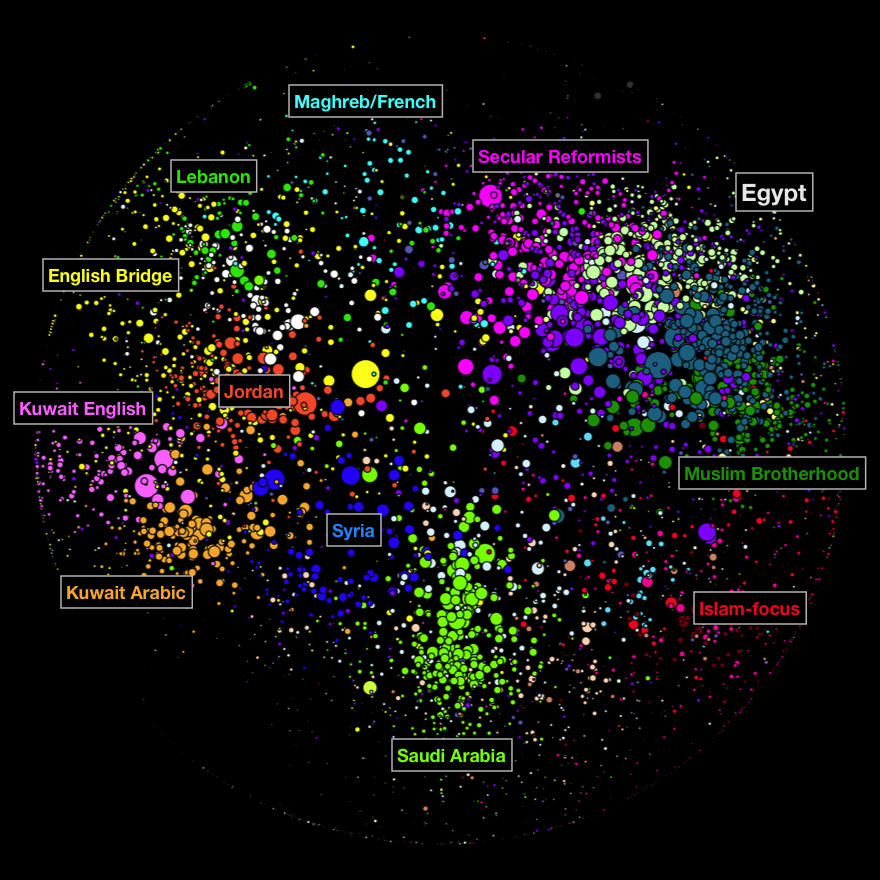Dana Diminescu (ed.): Social Science Information journal, Special issue: Diasporas on the Web (2012)
Filed under journal | Tags: · colonialism, diaspora, egypt, france, india, internet, lebanon, macedonia, nepal, palestine, tamil, tunisia, virtual communities, web, yugoslavia

“One of the major changes affecting diasporas the world over since the 1980s has been the increasing number of communities scattered throughout physical space, along with new forms of presence, regrouping, interaction and mobilization within digital territories.
This change calls for a renewal in epistemological approaches. The topics under study, as well as the conceptual and methodological tools used to analyse them, need to be reconsidered in the face of this evolution of diasporas. The articles published in this issue of SSI1 bear witness to such an effort: researchers and engineers involved in the e-Diasporas Atlas project have sought to find the most appropriate concepts, tools and methods to explore the Web of diasporas, based on a number of case studies. This work represents a vast new area of investigation, which is still under way.
In this introduction, we examine the different conceptual tools used during the research, analyse their relevance for the different diasporic communities on the Web and present the methodological chain developed within the e-Diasporas Atlas project as well as the most important findings.” (from the Introduction)
With contributions by Dana Diminescu, Anat Ben-David, Yann Scioldo-Zürcher, Houda Asal, Marta Severo and Eleonora Zuolo, Teresa Graziano, Ingrid Therwath, Priya Kumar, Tristan Bruslé, Kristina Balalovska, Francesco Mazzucchelli
Social Science Information, December 2012; 51 (4)
Publisher: SAGE, on behalf of Maison des Sciences de l’Homme, Paris
ISSN 0539-0184
245 pages
via ach
e-Diasporas Atlas project page (includes working papers and interactive graph)
Comment (0)Alain Badiou: The Rebirth of History: Times of Riots and Uprisings (2011–)
Filed under book | Tags: · arab spring, cultural revolution, egypt, france, islam, marxism, power, protest, revolution, riot

“Testing the winds of history blowing from the Arab revolts.
In the uprisings of the Arab world, Alain Badiou discerns echoes of the European revolutions of 1848. In both cases, the object was to overthrow despotic regimes maintained by the great powers—regimes designed to impose the will of financial oligarchies. Both events occurred after what was commonly thought to be the end of a revolutionary epoch: in 1815, the final defeat of Napoleon; and in 1989, the fall of the Soviet Union. But the revolutions of 1848 proclaimed for a century and a half the return of revolutionary thought and action. Likewise, the uprisings underway today herald a worldwide resurgence in the liberating force of the masses—despite the attempts of the ‘international community’ to neutralize its power.
Badiou’s book salutes this reawakening of history, weaving examples from the Arab Spring and elsewhere into a global analysis of the return of emancipatory universalism.”
Originally published as Le Reveil de l’histoire, Nouvelles Editions Lignes, 2011
Translated by Gregory Elliott
Publisher Verso Books, 2012
ISBN 1844678792, 9781844678792
126 pages
Reviews: Jasper Bernes and Joshua Clover (Los Angeles Review of Books), Daniel Tutt (Platypus), Anindya Bhattacharyya (Socialist Review).
PDF (updated on 2020-7-5)
Comment (0)Mapping the Arabic Blogosphere: Politics, Culture and Dissent (2009)
Filed under report | Tags: · blogging, culture, egypt, human rights, internet, islam, middle east, networks, politics, religion
“We conducted a study of the Arabic language blogosphere using link analysis, term frequency analysis, and human coding of individual blogs. We identified a base network of approximately 35,000 active blogs, created a network map of the 6,000 most connected blogs, and with a team of Arabic speakers hand coded 4,000 blogs. The goal for the study was to produce a baseline assessment of the networked public sphere in the Arab Middle East, and its relationship to a range of emergent issues, including politics, media, religion, culture, and international affairs.”
Authored by Bruce Etling, John Kelly, Rob Faris, John Palfrey, Internet and Democracy
Published by Berkman Center, June 2009
Internet & Democracy Case Study Series
Berkman Center Research Publication No. 2009-06
62 pages


